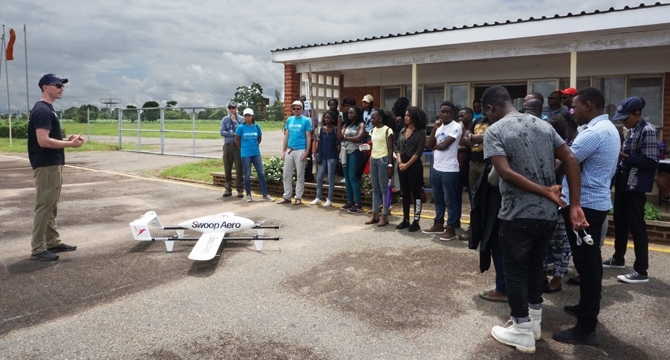Swoop Aero raises Series A funding led by Right Click Capital, Tempus Partners
Swoop Aero has closed a Series A funding round with returning investors Right Click Capital and Tempus Partners.

June 24, 2020: Swoop Aero has closed a Series A funding round with returning investors Right Click Capital and Tempus Partners, following a year of continued global growth momentum.
The home grown startup will use the latest capital injection to scale their impact from millions to tens of millions as they scale to their goal of servicing 100 million people with better access to healthcare by 2025. Swoop Aero will establish a presence in Australia and New Zealand, as well as expand its service offering across the medical logistics space. The funding will also serve to certify its aviation systems for operations over urban areas which will help the business come closer to their goal.
Eric Peck, CEO and co-founder of Swoop Aero said, “We most recently began drone operations delivering crucial medical supplies in Malawi with our pilots in South Africa and then subsequently from Australia due to heightened Covid-19 travel restrictions. Our vision is to transform the way the world moves essential supplies, and our Series A funding round will help us enable access to healthcare for one hundred million people by 2025.”
Since its launch in 2017, Swoop Aero has established operations in five countries through partnerships with global health leaders including UNICEF, UK Aid and Department for International Development (DFID), impacting over two million people, and most recently became the first company in the world to remotely pilot commercially used drones from another country, when delivering PPE and critical supplies in Malawi during the Covid-19 pandemic, whilst piloting the aircraft from Australia. Since the onset of the pandemic, in Malawi alone, Swoop Aero has tripled its fleet following a rapid increase in network utilisation due to a 300 percent increase of samples carried between March and April.
Garry Visontay, partner at Right Click Capital said, "We are delighted to back Swoop Aero again. We look for bold founders taking their early steps in building globally significant businesses and the Swoop team have certainly demonstrated early success in their vision to transform health supply chains across the globe. Their technical achievements are remarkable for such a young company, combining both deep aviation understanding and mechatronic systems expertise to develop a world-leading autonomous aviation system.”
With its sights firmly set on establishing a presence in ANZ, Swoop Aero has most recently begun working with the Civil Aviation Authority of New Zealand to achieve requisite beyond visual line of sight (BVLOS) approvals to transport pathology tests and samples locally via the air.
The company has already been working closely with the Australian government and the Civil Aviation Safety Authority (CASA) to slash red tape and enable aeromedical logistics services to be expanded in our vast land. In Australia alone, five per cent of pathology test samples are lost due to inefficient delivery methods, and often take up to a few weeks to return results. Using aeromedical drone logistics to transport medicines, pathology tests and samples, reduces chances of lost tests and improves turnaround times , enabling communities in urban, rural and remote areas faster, on-demand access to testing and supplies.
Alister Coleman, founder and managing partner at Tempus said, “Swoop is a great reminder that the best founders don’t stop during difficult times. We’re excited to continue backing Eric and Josh in their Series A, and their mission to deliver Swoop Aero’s vision. We invested in Swoop Aero at the Seed stage and over the last 12 months have seen the team move from strength to strength. Swoop has successfully executed drone networks in countries that need it most. But this logistical challenge isn’t limited to developing nations; Australia has its own challenges and is where Swoop could become a massive asset. We are not far from a future where networks of healthcare drones will ferry urgent supplies, pathology and medicine between hospitals and healthcare clinics in both developed and developing economies.”


